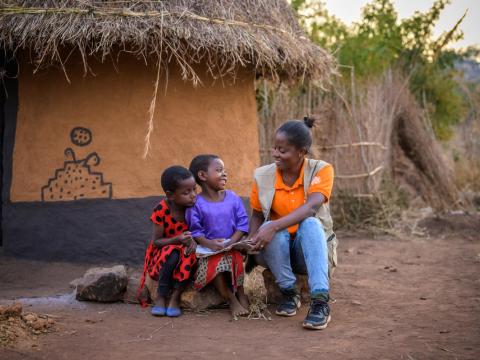Invisible in South Africa

Sipho (name changed) lives in a poor neighborhood with his 16-year-old aunt, his three siblings and two cousins - all under the age of five. His single mother died in 2008, due to HIV and AIDS, followed by his grandmother two years later.
Sipho is HIV-positive. His deteriorating health leaves him isolated. He does not attend school or play with other children because there is little understanding within the local community about how to treat his illness.
Before she died, Sipho’s grandmother tried to protect him by keeping his status a secret.
“We just knew he was always sick and my mother protected and loved him dearly, and would give him medication daily,” explains Khuthala, Sipho’s aunt.
After his grandmother died, Sipho’s medication ran out. Sipho’s family soon realised what it was for and they did not have the money to replace it. He has not been on anti-retrovirals for three years.
The situation is made worse by the lack of nutritious food in their home. Two years ago, Khuthala decided to give up school and take care of her siblings and cousins. She is still too young to be employed and cannot continue with her temporary domestic jobs because she also has a six-month-old baby to care for.
The nearest health facility, Taleni Clinic, is about five km away from their home. “The other day he was too sick and was crying a lot, so I tried to carry him on my back, taking him to the clinic, but could hardly travel one km carrying him – he was too heavy,” says Khuthala.
World Vision’s local staff in Mbashe recently learned about the family’s situation, and efforts to get Sipho to restart antiretroviral treatment are underway. “The situation of this family needs urgent attention. We cannot rest until we know it has changed for the better,” says World Vision’s local leader in Mbashe, Ernest Fraser.
The government’s Department of Social Services, who may have been able to help Sipho access lifesaving anti-retrovirals and nutrition supplements over the past three years, was unaware of Sipho’s situation until recently when they were notified by World Vision.
There are likely to be countless other children like Sipho who have gone unnoticed by government agencies even though there are policies designed to benefit these children. These unseen and uncounted children are not accessing the health services that could save their lives.
Sipho’s story provides just one heart-wrenching example of why World Vision is petitioning governments to keep better health data of their citizens. Proper funding for civil registration agencies for better record keeping is essential.
In order to make children like Sipho visible to the agencies that can help them, families and communities must be at the forefront of efforts to collect local statistics and monitor the availability and quality of local health services. When communities are empowered to collect local data and feed this information into national information systems, they can not only ensure that there are good national-level statistics, but they can also use this information to advocate for solutions to local challenges.
World Vision recently released the report ‘Uncounted and Unreached’ which highlights the need for better health data, you can read it HERE. During the Global Week of Action from the 1-8 May, millions of citizens around the world stood up for the unseen and uncounted children like Sipho. You can join the movement and take action HERE.